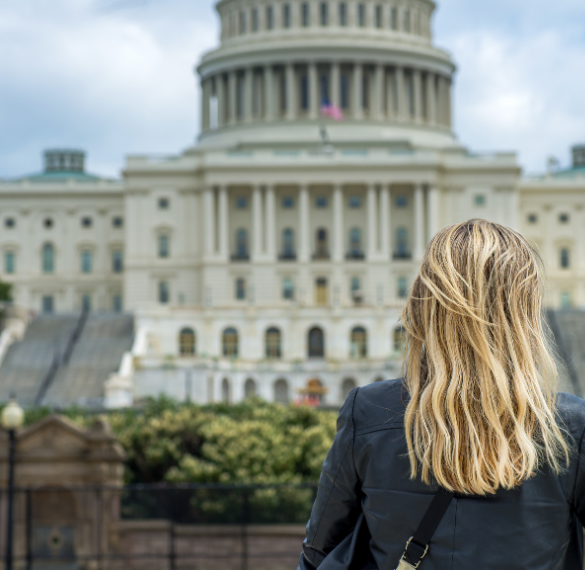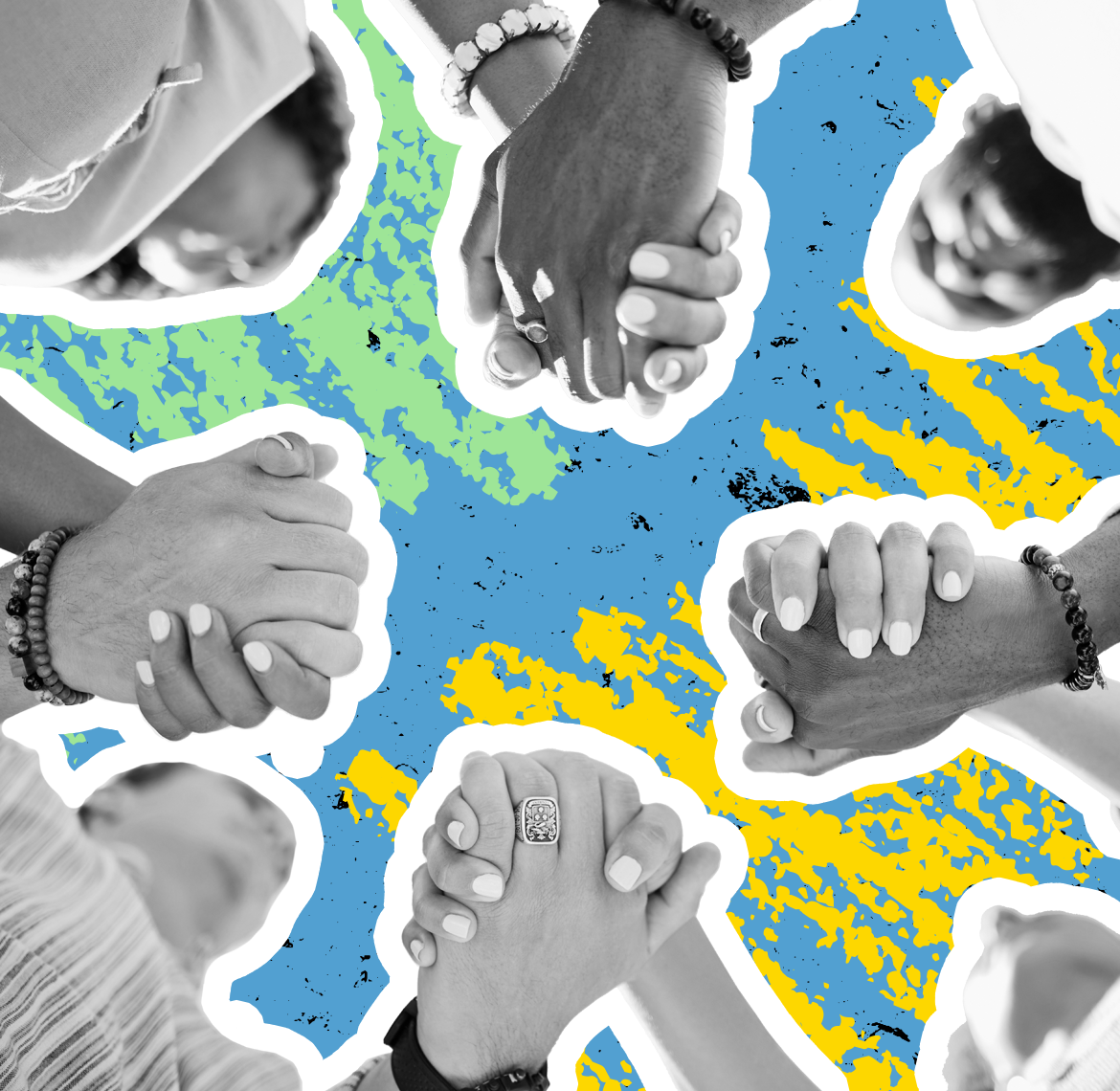Federal Legislation
We work tirelessly to help Congress pass meaningful anti-sexual violence laws. See the RAINN-endorsed federal laws promoting prevention, healing, and justice.

Our bipartisan partnerships with U.S. lawmakers help create, advance, and pass legislation that strengthens protections for survivors and holds offenders accountable.
RAINN’s attorneys and advocates work year-round to:
- Draft policy recommendations
- Develop legislation
- Activate grassroots initiatives
- Facilitate testimony from survivors and experts
- Distribute letters of support for priority bills
- Directly lobby the nation’s lawmakers
2025 Federal Legislative Wins
TAKE IT DOWN Act (2025)
Signed into law on May 19, 2025, the TAKE IT DOWN Act creates the first federal protections specifically addressing tech-enabled sexual abuse. This landmark legislation’s provisions included:
- Clear criminalization. The law criminalizes sharing or threatening to share nonconsensual intimate images, including AI-generated deepfakes.
- Takedown requirements. TAKE IT DOWN mandates that online platforms remove such content within 48 hours of a verified survivor’s request.

“We know how quickly harm can happen online. Survivors have seen their images spread across the internet in minutes. So we’re asking tech companies: what are you waiting for?”
– RAINN Founder and President, Scott Berkowitz
20.8%
Over 20% of 2024’s RAINN-endorsed federal bills earned bipartisan Congressional support and became law.
300,000
In 2024, the RAINN-backed Debbie Smith Act reduced the rape kit backlog and surpassed 300k DNA database matches.
100%
RAINN secured overwhelming bipartisan support for every bill we endorsed in 2024.
These RAINN-endorsed bills successfully advanced through Congress and were signed into law in 2024.

REPORT Act (2024)
The Revising Existing Procedures On Reporting via Technology (REPORT) Act strengthens online protections for children, motivating platforms to take child sexual abuse material seriously and helping to rescue kids from harm more quickly. This law’s provisions included:
- Reporting requirements. The REPORT Act ensures tech platforms alert law enforcement about online child abuse, so child survivors can be identified and helped faster.
- Impactful penalties. The REPORT Act increases penalties (up to $1 million) for companies that don’t report sexual exploitation, incentivizing them to prioritize child safety and prevent future victimization.
Victims’ VOICES Act (2024)
The Victims’ VOICES Act ensures that survivors’ families and advocates can receive restitution for costs incurred while supporting the survivor. This law’s provisions included:
- Critical financial relief. It enables “restitution for expenses of persons who have assumed the victim’s rights,” meaning a convicted offender must reimburse those who help the survivor obtain services or attend court. For example, parents of child survivors often miss work and pay out-of-pocket for counseling and travel. Thanks to this act, they can be repaid for these expenses.


Project Safe Childhood Act (2024)
Included in the FY2025 National Defense Authorization Act, the Project Safe Childhood Act modernizes and reauthorizes a program to combat online child exploitation. This law’s provisions included:
- Improved investigations. Project Safe Childhood provides law enforcement with new resources and training to investigate internet crimes against children and to rescue children who are being abused online.
- Expanded prosecution resources. It mandates that the U.S. Attorney General develop best practices for prioritizing online exploitation cases and funds additional prosecutors dedicated to child exploitation cases.
Stop Institutional Child Abuse Act (2024)
The Stop Institutional Child Abuse Act was a bipartisan breakthrough to protect youth in residential treatment programs (such as “troubled teen” facilities). Signed into law in late 2024, this act will transform how residential youth programs are run and managed. The law’s provisions included:
- Transparency. This act establishes a federal working group to set best practices, improve data transparency (including a possible national database on youth treatment facilities), and study abusive practices like improper restraints.
- Accountability. The Stop Institutional Child Abuse Act requires the government to collect data and report on treatment facilities, exposing patterns of abuse and preventing future neglect or mistreatment of kids in these programs.


Debbie Smith Act Reauthorization (2024)
Twenty years after its inception, the Debbie Smith Act was reauthorized in July 2024 for an additional five years. President Biden, who cosponsored the original bill in 2004, signed this reauthorization into law, extending the Debbie Smith DNA Backlog Grant Program through FY2029. This program funds state and local crime labs to test DNA evidence, including sexual assault kits at up to $151 million per year.
2022 Federal Legislative Wins
Violence Against Women Act (VAWA) Reauthorization (2022)
The Violence Against Women Act was renewed in 2022, continuing this life-saving law’s legacy for the modern era. The VAWA reauthorization’s provisions included:
- Expanded assistance. It preserved and expanded core VAWA programs that support survivors of domestic violence, sexual assault, dating violence, and stalking.
- Increased access. This reauthorization bolstered funding for shelters, rape crisis centers, and legal assistance, and updated provisions to close gaps in access to services for survivors.
Trafficking Victims Prevention and Protection Reauthorization Act of 2022
Congress passed the Trafficking Victims Prevention and Protection Reauthorization Act to strengthen the nation’s response to human trafficking, renewing funding through 2028. The law’s provisions included:
- Expanded services for at-risk youth. It funds state and community programs that support young people vulnerable to trafficking—especially those transitioning out of foster care or experiencing homelessness, substance use, or abuse.
- Increased federal accountability. It requires anti-trafficking training for all federal employees, demands the monitoring of government supply chains for forced labor, and improves access to mental health and substance use services for survivors.
Abolish Trafficking Reauthorization Act of 2022
Congress renewed and expanded critical federal efforts to prevent human trafficking and support survivors by passing the Frederick Douglass Trafficking Victims Prevention and Protection Reauthorization Act. This law builds on decades of bipartisan with provisions that included:
- Renewed funding. The reauthorization invests in prevention and survivor services by funding programs that educate youth, support housing and trauma recovery for survivors, and provide grants to state and local organizations tackling trafficking in their communities.
- Resources and training. Supports law enforcement and prosecution by improving data collection, enhancing anti-trafficking task forces, and expanding training for law enforcement to better identify and support victims.
- International action. Advances U.S. leadership on human trafficking by supporting international anti-trafficking programs and maintaining the annual Trafficking in Persons (TIP) Report to hold countries accountable for protecting human rights.
Pre-2020 Federal Wins
2014: Debbie Smith Act Reauthorization
In 2014, Congress overwhelmingly reauthorized the Debbie Smith Act, sustaining the effort to eliminate the nation’s rape kit backlog. This reauthorization maintained funding levels (authorized at $151 million annually) for the DNA Backlog Grant Program through 2019. New provisions included:
Greater transparency and efficiency. The 2014 updates incorporated the SAFER Act provisions, requiring local agencies to develop clear plans to reduce their backlogs and publicly disclose the number of untested kits.
2014: Campus Sexual Violence Elimination Act (SaVE)
2014 saw the Campus Sexual Violence Elimination Act (SaVE) enacted as part of VAWA 2013’s implementation in March 2014, strengthening sexual assault reporting and prevention on college campuses—another win for young survivors.
2013: Sexual Assault Forensic Evidence Reporting (SAFER) Act
As part of VAWA’s 2013 reauthorization, Congress passed the SAFER Act (Sexual Assault Forensic Evidence Reporting Act), a major victory in the fight to end the rape kit backlog. This act’s provisions included:
- Transparency and accountability. It requires law enforcement agencies to audit and publicly report the number of untested sexual assault kits in their possession, confronting the “hidden backlog” head-on.
- Funding reallocation. SAFER ensures that at least 75% of Debbie Smith Act grants go directly toward testing kits and increasing lab capacity (rather than administrative overhead).
2013: Violence Against Women Act Reauthorization
The bipartisan VAWA Reauthorization of 2013 “strengthens [VAWA] with increased protections for Native American women and other victims previously left vulnerable by gaps in the law.” Notably, VAWA 2013’s provisions included:
- Justice on tribal lands. VAWA 2013 closed a loophole that had allowed non-Indigenous abusers to evade accountability for domestic violence in Indian Country. Now, tribal courts can prosecute non-Native partners who abuse Native women on reservations.
- Expanded protections. The 2013 law added nondiscrimination provisions so that programs receiving VAWA funds cannot turn someone away based on “race, sexual orientation, gender identity, immigration status, or tribal affiliation.” It also expanded services for immigrant survivors (including provisions related to U visas and T visas).
2008: Debbie Smith Act Reauthorization
The Debbie Smith Reauthorization Act of 2008 extended the Debbie Smith DNA Backlog Grant Program through 2014, keeping funding levels steady (authorized at $151 million per year) to help crime labs process DNA evidence from sexual assaults.
2006: Adam Walsh Child Protection and Safety Act
The Adam Walsh Act is a sweeping law named after 6-year-old Adam Walsh, aimed at protecting children and communities from sexual predators. Congress recognized RAINN’s work in this legislation, citing RAINN’s contribution to the 50% drop in sexual violence since the 1990s. This law’s provisions included:
- Nationwide sex offender registry. The act created the Dru Sjodin National Sex Offender Public Website, the first nationwide sex offender registry that allowed anyone to search for convicted sex offenders in any state.
- Sustained funding for RAINN’s National Sexual Assault Hotline. The Adam Walsh Act authorized an annual federal grant to RAINN, ensuring that survivors nationwide continue to have 24/7 access to free, confidential help.
2006: Project Safe Childhood
The 2006 Adam Walsh Act launched the Project Safe Childhood initiative, boosting efforts to investigate and prosecute online child exploitation.
2005: DNA Fingerprint Act
The DNA Fingerprint Act of 2005 was a breakthrough in using DNA technology to solve crimes. RAINN strongly supported this measure, noting it “will significantly enhance law enforcement’s ability to identify and capture serial violent criminals.” This law’s provisions included:
- Expanded DNA collection. It allows law enforcement to collect DNA samples from individuals arrested or detained by federal authorities (not just those convicted) and add those profiles to CODIS, the national DNA database.
- Increased justice. This law supercharged the ability to solve cold cases. Many survivors of older, unsolved rapes have since seen justice because the perpetrator’s DNA from a later arrest was finally matched to their rape kit.
2005: Violence Against Women Act Reauthorization
The 2005 reauthorization of VAWA (passed as part of the Violence Against Women and Department of Justice Reauthorization Act of 2005) updated and expanded the landmark law with provisions that included:
- The Sexual Assault Services Program (SASP). This reauthorization established the first dedicated federal funding stream for sexual assault victim services. SASP ensures that rape crisis centers and sexual assault coalitions in every state received funding specifically to help survivors of sexual violence.
- Housing and economic protections. This reauthorization recognized that survivors often faced homelessness or financial insecurity when escaping abuse. It included protections so that a survivor cannot be evicted from public housing or denied a lease solely for being a victim of domestic violence. It also expanded job protection and unpaid leave options (building on the 2000 law) for survivors attending court or getting medical care.
2004: Debbie Smith Act
The Debbie Smith Act of 2004 is widely regarded as one of the most important anti-rape laws in U.S. history. Passed as part of the Justice for All Act, it was the first federal legislation to tackle the nation’s backlog of untested rape kits. It was named after Debbie Smith, a survivor whose DNA evidence was finally matched to the perpetrator’s when his own DNA was tested more than six years after the crime. The law’s provisions included:
Federal funds for DNA testing. Before 2004, a lack of resources often meant years would pass before DNA evidence was tested. This act changed that by pouring federal funds into DNA testing. Since its passage, over 645,000 DNA crime scene samples have been processed and added to CODIS, resulting in more than 300,000 hits (matches) in the database as of 2024.
1994: Violence Against Women Act
Passed with bipartisan support, the Violence Against Women Act of 1994 was the first federal law to comprehensively address sexual assault, domestic violence, dating violence, and stalking as serious crimes. The law’s provisions included:
- Vital services and support. VAWA made federal funds available for emergency shelters, counseling, legal aid, and hotlines for survivors. The National Domestic Violence Hotline (created by VAWA in 1996) has received over 7 million calls, a testament to how many people have been reached and lives saved.
- Enhanced training. VAWA funded training for police and prosecutors in handling sensitive cases and encouraged pro-arrest policies in domestic violence incidents.
- Improved protective orders. VAWA mandated “full faith and credit” for protective orders nationwide, meaning if a survivor gets a restraining order in one state, every other state must honor it. VAWA has been credited with contributing to a 56% decline in intimate partner violence rates over two decades.
If you or someone you know has experienced sexual assault, you are not alone. RAINN’s National Sexual Assault Hotline offers free, confidential, 24/7 support in English and en Español.
Call 800.656.HOPE (4673)
Chat at hotline.RAINN.org
Text HOPE to 64673
Join Our Community
Join the Fight for a World Free from Sexual Violence
Sign up for inspiring stories, important updates from RAINN, and tools to take action in your community.

